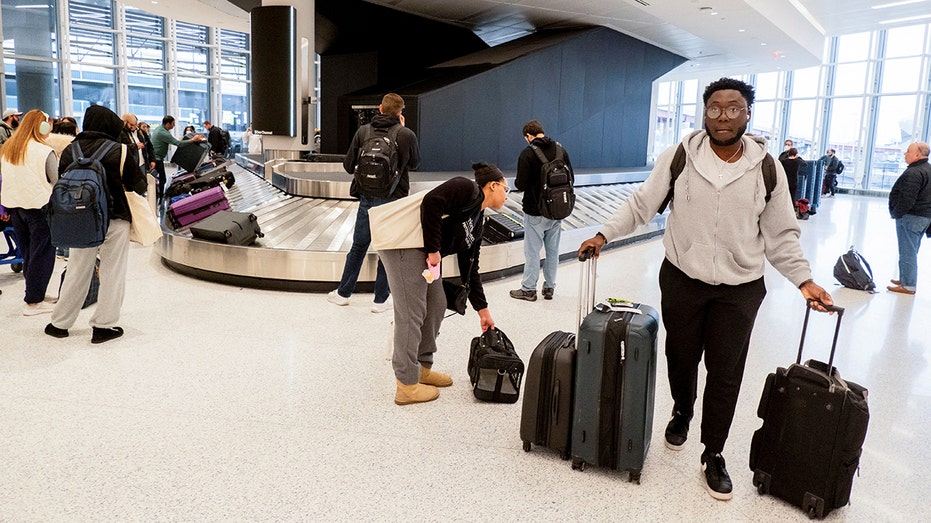Your discarded luggage tags are worth money to scammers
Bad actors can use almost anything to scam you. You've already heard about them using personal information such as phone numbers, email addresses and government IDs to commit identity theft. But they don't stop there. There have been reports of hackers using your home's location on maps to blackmail you or impersonating your boss to demand money.These are still very believable tactics, but did you know that even the luggage tags you barely notice can be misused? That's correct. Well, now bad actors are targeting luggage tags to file for reimbursement.Sign up for my FREE CyberGuy ReportGet my best tech tips, urgent security alerts and exclusive deals delivered straight to your inbox. Plus, youll get instant access to my Ultimate Scam Survival Guide free when you join myCYBERGUY.COM newsletter.AIRLINES SECRETLY SOLD US TRAVELERS DATA TO HOMELAND SECURITYAn alleged baggage claims manager at Delta Air Lines has warned travelers about a growing scam that uses discarded luggage tags to commit fraud.In a Reddit post that has since drawn thousands of comments, the worker claimed scammers are watching passengers remove their tags at baggage claim and retrieving them to submit fake claims for lost luggage. The tags often contain enough personal and travel information to file for reimbursement."There's been an influx of fraudulent claims using tossed luggage tags," the worker wrote."It's creating issues for people with legitimate claims."The post advises waiting until you are away from the airport before removing tags from checked bags and avoiding leaving them in hotel trash cans. Former hotel staff commenting on the post said they had seen similar fraud schemes involving tags found in guest rooms.Travelers responding to the warning also noted that printed boarding passes can be exploited in the same way, and shared examples of airports, such as in Japan, that provide secure disposal bins for tags.FBI WARNS OF QR CODE SCAM DISGUISED IN MYSTERY PACKAGESThe luggage tag scam is a documented and growing problem in 2025, with airport workers, especially baggage claims staff at major airlines, reporting a surge in fraudulent lost luggage claims tied to discarded tags.Multiple firsthand accounts confirm that processing legitimate compensation is being complicated by false claims using details found on bag tags. However, travel security experts and industry observers note that, while cases are increasing, the scam may not be extremely widespread or high-volume at this time.Most tags only contain limited information, such as name, flight number and baggage IDs, and airlines' tracking systems can sometimes detect if a claim is fake by reviewing baggage scan logs and RFID tagging. There are also no official warnings or statistics from major airlines, government authorities or law enforcement indicating this technique has reached epidemic levels or led to confirmed prosecutions.CLICK HERE TO GET THE FOX NEWS APPThe luggage tag scam might not sound like the most dangerous travel threat, but ignoring it can still leave you exposed to fraud. Here are simple, effective steps to protect yourself.Wait until you're at home, in your car or in another private location before taking tags off your checked bags. This prevents scammers from grabbing them in public areas.Never toss tags in the trash intact. Tear them up or cut through barcodes and printed details so they can't be reused for fake claims.Dispose of tags yourself instead of leaving them in a hotel wastebasket. Cleaning staff or other guests could find and misuse them.Treat printed boarding passes the same way as luggage tags. Keep them until you can destroy them securely.Watch for anyone loitering near the carousel and observing passengers closely. Stay aware of your surroundings while handling travel documents.Opt for mobile boarding passes instead of printed ones. This removes the risk of discarded paper passes falling into the wrong hands.Avoid printing your full home address or primary phone number. Instead, use your name, a travel-only email and either a P.O. box or work address. You can even create a simple alias email just for travel, which forwards to your main inbox but keeps your real address private. This way, airlines and honest finders can still reach you without exposing sensitive personal details to scammers.For recommendations on private and secure email providers that offer alias addresses, visitCyberguy.com.Another way to protect yourself is by putting a small tracker inside your luggage, such as anApple AirTag or asimilar Bluetooth tracker. These devices connect to your phone and let you see where your bag is in near real-time. If your suitcase goes missing or ends up in the wrong place, youll know faster than waiting for the airline to track it down.Place the tracker inside your bag rather than on the handle so it cant be easily removed. Check its location through your phone before leaving the airport, and keep an eye on it during layovers. While AirTags cant prevent someone from misusing an old luggage tag, they give you proof of where your bag actually is if you ever need to dispute a lost luggage claim or theft.While the luggage tag scam may not be widespread yet, it exploits a simple oversight that most travelers rarely consider. Until airlines and airports put better safeguards in place, the burden falls on passengers to protect their own information. That means treating something as ordinary as a bag tag like sensitive data.What do you do with your luggage tags after your trip? Let us know by writing to us atCyberguy.com.Sign up for my FREE CyberGuy ReportGet my best tech tips, urgent security alerts and exclusive deals delivered straight to your inbox. Plus, youll get instant access to my Ultimate Scam Survival Guide free when you join myCYBERGUY.COM newsletter.Copyright 2025 CyberGuy.com. All rights reserved.




